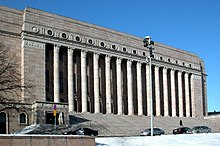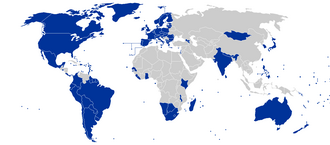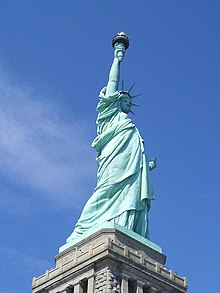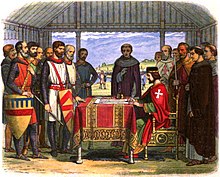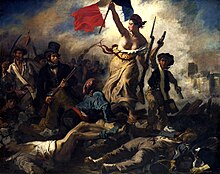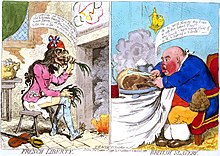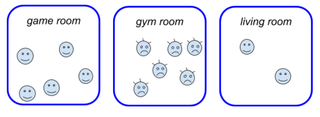The Eduskunta, the parliament of Finland as the Grand Duchy of Finland, had universal suffrage in 1906. Several nations and territories can present arguments for being the first with universal suffrage.
Liberal democracy is a liberal political ideology and a form of government in which representative democracy operates under the principles of classical liberalism. Also called western democracy, it is characterised by elections between multiple distinct political parties, a separation of powers into different branches of government, the rule of law in everyday life as part of an open society, and the equal protection of human rights, civil rights, civil liberties and political freedoms for all people. To define the system in practice, liberal democracies often draw upon a constitution, either formally written or uncodified, to delineate the powers of government and enshrine the social contract. After a period of sustained expansion throughout the 20th century, liberal democracy became the predominant political system in the world.
A liberal democracy may take various constitutional forms: it may be a constitutional monarchy (Australia, Belgium, Canada, Japan, Netherlands, Norway, Spain, the United Kingdom) or a republic (France, India, Italy, Ireland, the United States). It may have a parliamentary system (Australia, Canada, India, Israel, Ireland, Italy, the United Kingdom), a presidential system (Indonesia, the United States) or a semi-presidential system (France, Romania).
Liberal democracies usually have universal suffrage, granting all adult citizens the right to vote regardless of race, gender or property ownership. However, historically some countries regarded as liberal democracies have had a more limited franchise, and some do not have secret ballots. There may also be qualifications such as voters being required to register before being allowed to vote. The decisions made through elections are made not by all of the citizens but rather by those who are eligible and who choose to participate by voting.
The liberal democratic constitution defines the democratic character of the state. The purpose of a constitution is often seen as a limit on the authority of the government. Liberal democracy emphasises the separation of powers, an independent judiciary and a system of checks and balances between branches of government. Liberal democracies are likely to emphasise the importance of the state being a Rechtsstaat, i.e. a state that follows the principle of rule of law. Governmental authority is legitimately exercised only in accordance with written, publicly disclosed laws adopted and enforced in accordance with established procedure. Many democracies use federalism—also known as vertical separation of powers—in order to prevent abuse and increase public input by dividing governing powers between municipal, provincial and national governments (e.g., Germany, where the federal government assumes the main legislative responsibilities and the federated Länder assume many executive tasks).
Origins
Liberal democracy traces its origins—and its name—to the European 18th-century, also known as the Age of Enlightenment. At the time, the vast majority of European states were monarchies, with political power held either by the monarch or the aristocracy. The possibility of democracy had not been a seriously considered political theory since classical antiquity and the widely held belief was that democracies would be inherently unstable and chaotic in their policies due to the changing whims of the people. It was further believed that democracy was contrary to human nature, as human beings were seen to be inherently evil, violent and in need of a strong leader to restrain their destructive impulses. Many European monarchs held that their power had been ordained by God and that questioning their right to rule was tantamount to blasphemy.These conventional views were challenged at first by a relatively small group of Enlightenment intellectuals, who believed that human affairs should be guided by reason and principles of liberty and equality. They argued that all people are created equal and therefore political authority cannot be justified on the basis of "noble blood", a supposed privileged connection to God or any other characteristic that is alleged to make one person superior to others. They further argued that governments exist to serve the people—not vice versa—and that laws should apply to those who govern as well as to the governed (a concept known as rule of law).
Some of these ideas began to be expressed in England in the 17th century. There was renewed interest in Magna Carta, and passage of the Petition of Right in 1628 and Habeas Corpus Act in 1679 established certain liberties for subjects. The idea of a political party took form with groups debating rights to political representation during the Putney Debates of 1647. After the English Civil Wars (1642–1651) and the Glorious Revolution of 1688, the Bill of Rights was enacted in 1689, which codified certain rights and liberties. The Bill set out the requirement for regular elections, rules for freedom of speech in Parliament and limited the power of the monarch, ensuring that, unlike much of Europe at the time, royal absolutism would not prevail. This led to significant social change in Britain in terms of the position of individuals in society and the growing power of Parliament in relation to the monarch.
By the late 18th century, leading philosophers of the day had published works that spread around the European continent and beyond. These ideas and beliefs inspired the American Revolution and the French Revolution, which gave birth to the ideology of liberalism and instituted forms of government that attempted to apply the principles of the Enlightenment philosophers into practice. Neither of these forms of government was precisely what we would call a liberal democracy we know today (the most significant differences being that voting rights were still restricted to a minority of the population and slavery remained a legal institution) and the French attempt turned out to be short-lived, but they were the prototypes from which liberal democracy later grew. Since the supporters of these forms of government were known as liberals, the governments themselves came to be known as liberal democracies.
When the first prototypical liberal democracies were founded, the liberals themselves were viewed as an extreme and rather dangerous fringe group that threatened international peace and stability. The conservative monarchists who opposed liberalism and democracy saw themselves as defenders of traditional values and the natural order of things and their criticism of democracy seemed vindicated when Napoleon Bonaparte took control of the young French Republic, reorganised it into the first French Empire and proceeded to conquer most of Europe. Napoleon was eventually defeated and the Holy Alliance was formed in Europe to prevent any further spread of liberalism or democracy. However, liberal democratic ideals soon became widespread among the general population and over the 19th century traditional monarchy was forced on a continuous defensive and withdrawal. The dominions of the British Empire became laboratories for liberal democracy from the mid 19th century onward. In Canada, responsible government began in the 1840s and in Australia and New Zealand, parliamentary government elected by male suffrage and secret ballot was established from the 1850s and female suffrage achieved from the 1890s.
Reforms and revolutions helped move most European countries towards liberal democracy. Liberalism ceased being a fringe opinion and joined the political mainstream. At the same time, a number of non-liberal ideologies developed that took the concept of liberal democracy and made it their own. The political spectrum changed; traditional monarchy became more and more a fringe view and liberal democracy became more and more mainstream. By the end of the 19th century, liberal democracy was no longer only a "liberal" idea, but an idea supported by many different ideologies. After World War I and especially after World War II, liberal democracy achieved a dominant position among theories of government and is now endorsed by the vast majority of the political spectrum.
Although liberal democracy was originally put forward by Enlightenment liberals, the relationship between democracy and liberalism has been controversial since the beginning and was problematized in the 20th century. In his book Freedom and Equality in a Liberal Democratic State, Jasper Doomen posited that freedom and equality are necessary for a liberal democracy. The research institute Freedom House today simply defines liberal democracy as an electoral democracy also protecting civil liberties.
Rights and freedoms
In practice, democracies do have limits on certain freedoms. There are various legal limitations such as copyright and laws against defamation. There may be limits on anti-democratic speech, on attempts to undermine human rights and on the promotion or justification of terrorism. In the United States more than in Europe, during the Cold War such restrictions applied to communists. Now they are more commonly applied to organisations perceived as promoting actual terrorism or the incitement of group hatred. Examples include anti-terrorism legislation, the shutting down of Hezbollah satellite broadcasts and some laws against hate speech. Critics claim that these limitations may go too far and that there may be no due and fair judicial process.The common justification for these limits is that they are necessary to guarantee the existence of democracy, or the existence of the freedoms themselves. For example, allowing free speech for those advocating mass murder undermines the right to life and security. Opinion is divided on how far democracy can extend to include the enemies of democracy in the democratic process. If relatively small numbers of people are excluded from such freedoms for these reasons, a country may still be seen as a liberal democracy. Some argue that this is only quantitatively (not qualitatively) different from autocracies that persecute opponents, since only a small number of people are affected and the restrictions are less severe, but others emphasise that democracies are different. At least in theory, opponents of democracy are also allowed due process under the rule of law.
However, many governments considered to be democratic have restrictions upon expressions considered anti-democratic, such as Holocaust denial and hate speech, including prison sentences, ofttimes seen as anomalous for the concept of free speech. Members of political organisations with connections to prior totalitarianism (typically formerly predominant communist, fascist or National Socialists) may be deprived of the vote and the privilege of holding certain jobs. Discriminatory behaviour may be prohibited, such as refusal by owners of public accommodations to serve persons on grounds of race, religion, ethnicity, gender or sexual orientation. For example, in Canada a printer who refused to print materials for the Canadian Lesbian and Gay Archives was fined $5,000, incurred $100,000 in legal fees and was ordered to pay a further $40,000 of his opponents' legal fees by the Human Rights Tribunal.
Other rights considered fundamental in one country may be foreign to other governments. For instance, the constitutions of Canada, India, Israel, Mexico and the United States guarantee freedom from double jeopardy, a right not provided in other legal systems. Also, legal systems that use politically elected court jurors, such as Sweden, view a (partly) politicised court system as a main component of accountable government, distinctly alien to democracies employing trial by jury designed to shield against the influence of politicians over trials. Similarly, many Americans consider the right to keep and bear arms to be an essential feature to safeguard the right to revolution against a potentially abusive government, while other countries do not recognise this as fundamental (the United Kingdom, for example, having strict limitations on the gun ownership by individuals).
Preconditions
Although they are not part of the system of government as such, a modicum of individual and economic freedoms, which result in the formation of a significant middle class and a broad and flourishing civil society, are often seen as pre-conditions for liberal democracy (Lipset 1959).For countries without a strong tradition of democratic majority rule, the introduction of free elections alone has rarely been sufficient to achieve a transition from dictatorship to democracy; a wider shift in the political culture and gradual formation of the institutions of democratic government are needed. There are various examples—for instance, in Latin America—of countries that were able to sustain democracy only temporarily or in a limited fashion until wider cultural changes established the conditions under which democracy could flourish.
One of the key aspects of democratic culture is the concept of a "loyal opposition", where political competitors may disagree, but they must tolerate one another and acknowledge the legitimate and important roles that each play. This is an especially difficult cultural shift to achieve in nations where transitions of power have historically taken place through violence. The term means in essence that all sides in a democracy share a common commitment to its basic values. The ground rules of the society must encourage tolerance and civility in public debate. In such a society, the losers accept the judgment of the voters when the election is over and allow for the peaceful transfer of power. The losers are safe in the knowledge that they will neither lose their lives nor their liberty and will continue to participate in public life. They are loyal not to the specific policies of the government, but to the fundamental legitimacy of the state and to the democratic process itself.
Liberal democracies around the world
Map reflecting the findings of Freedom House's 2016 survey, concerning the state of world freedom in 2015, which correlates highly with other measures of democracy, though some of these estimates are disputed and controversial
Percentage of countries in each category, from Freedom House's 1973 through 2013 reports
States by their systems of government (for the complete list of systems by country, see List of countries by system of government)
constitutional monarchies in which the monarch personally exercises power, often alongside a weak parliament
republics whose constitutions grant only one party the right to govern
republics where constitutional provisions for government have been suspended
states that do not fit in any of the above listed systems
no government
Countries highlighted in blue are designated "electoral democracies" in Freedom House's 2017 survey "Freedom in the World", covering the year 2016
There is agreement amongst several intellectuals and organisations such as Freedom House that the states of the European Union, Norway, Iceland, Switzerland, Japan, Argentina, Brazil, Chile, South Korea, Taiwan, the United States, India, Canada, Mexico, Uruguay, Costa Rica, Israel, South Africa, Australia and New Zealand are liberal democracies, with India currently having the largest population among the democracies in the world. Most liberal democracies are Western societies (with exception of Japan, India and South Korea).
Freedom House considers many of the officially democratic governments in Africa and the former Soviet Union to be undemocratic in practice, usually because the sitting government has a strong influence over election outcomes. Many of these countries are in a state of considerable flux.
Officially non-democratic forms of government, such as single-party states and dictatorships, are more common in East Asia, the Middle East and North Africa.
Types
Proportional vs. plurality representation
Plurality voting system award seats according to regional majorities. The political party or individual candidate who receives the most votes, wins the seat which represents that locality. There are other democratic electoral systems, such as the various forms of proportional representation, which award seats according to the proportion of individual votes that a party receives nationwide or in a particular region.One of the main points of contention between these two systems is whether to have representatives who are able to effectively represent specific regions in a country, or to have all citizens' vote count the same, regardless of where in the country they happen to live.
Some countries, such as Germany and New Zealand, address the conflict between these two forms of representation by having two categories of seats in the lower house of their national legislative bodies. The first category of seats is appointed according to regional popularity and the remainder are awarded to give the parties a proportion of seats that is equal—or as equal as practicable—to their proportion of nationwide votes. This system is commonly called mixed member proportional representation.
Australia incorporates both systems in having the preferential voting system applicable to the lower house and proportional representation by state in the upper house. This system is argued to result in a more stable government, while having a better diversity of parties to review its actions.
Presidential vs. parliamentary systems
A presidential system is a system of government of a republic in which the executive branch is elected separately from the legislative. A parliamentary system is distinguished by the executive branch of government being dependent on the direct or indirect support of the parliament, often expressed through a vote of confidence.The presidential system of democratic government has been adopted in Latin America, Africa and parts of the former Soviet Union, largely by the example of the United States. Constitutional monarchies (dominated by elected parliaments) are present in Northern Europe and some former colonies which peacefully separated, such as Australia and Canada. Others have also arisen in Spain, East Asia and a variety of small nations around the world. Former British territories such as South Africa, India, Ireland and the United States opted for different forms at the time of independence. The parliamentary system is widely used in the European Union and neighboring countries.
Issues and criticism
Dictatorship of the bourgeoisie
Some Marxists, communists, socialists and anarchists argue that liberal democracy, under capitalist ideology, is constitutively class-based and therefore can never be democratic or participatory. It is referred to as bourgeois democracy because ultimately politicians fight only for the rights of the bourgeoisie.According to Marx, representation of the interests of different classes is proportional to the influence which a particular class can purchase (through bribes, transmission of propaganda through mass media, economic blackmail, donations for political parties and their campaigns, etc.). Thus, the public interest, in so-called liberal democracies, is systematically corrupted by the wealth of those classes rich enough to gain (the appearance of) representation. Because of this, multi-party democracies under capitalist ideology are always distorted and anti-democratic, their operation merely furthering the class interests of the owners of the means of production. The bourgeois class becomes wealthy through a drive to appropriate the surplus-value of the creative labours of the working class. This drive obliges the bourgeois class to amass ever-larger fortunes by increasing the proportion of surplus-value by exploiting the working class through capping workers' terms and conditions as close to poverty levels as possible (Incidentally, this obligation demonstrates the clear limit to bourgeois freedom, even for the bourgeoisie itself.). Thus, according to Marx, parliamentary elections are no more than a cynical, systemic attempt to deceive the people by permitting them, every now and again, to endorse one or other of the bourgeoisie's predetermined choices of which political party can best advocate the interests of capital. Once elected, this parliament, as a dictatorship of the bourgeoisie, enacts regulations that actively support the interests of its true constituency, the bourgeoisie (such as bailing out Wall St investment banks; direct socialisation/subsidisation of business—GMH, US/European agricultural subsidies; and even wars to guarantee trade in commodities such as oil).
Vladimir Lenin once argued that liberal democracy had simply been used to give an illusion of democracy while maintaining the dictatorship of the bourgeoisie.
The cost of political campaigning in representative democracies favors the rich, a form of plutocracy where only a very small number of individuals can actually affect government policy. In Athenian democracy, some public offices were randomly allocated to citizens, in order to inhibit the effects of plutocracy. Aristotle described the law courts in Athens which were selected by lot as democratic and described elections as oligarchic.
Liberal democracy has also been attacked by some socialists as a dishonest farce used to keep the masses from realizing that their will is irrelevant in the political process, while at the same time a conspiracy for making them restless for some political agenda. Some contend that it encourages candidates to make deals with wealthy supporters, offering favorable legislation if the candidate is elected—perpetuating conspiracies for monopolisation of key areas. Campaign finance reform is an attempt to correct this perceived problem.
In response to these claims, United States economist Steven Levitt argues in his book Freakonomics that campaign spending is no guarantee of electoral success. He compared electoral success of the same pair of candidates running against one another repeatedly for the same job, as often happens in United States Congressional elections, where spending levels varied. He concludes:
- "A winning candidate can cut his spending in half and lose only 1 percent of the vote. Meanwhile, a losing candidate who doubles his spending can expect to shift the vote in his favor by only that same 1 percent."
Media
Critics of the role of the media in liberal democracies allege that concentration of media ownership leads to major distortions of democratic processes. In Manufacturing Consent: The Political Economy of the Mass Media, Edward S. Herman and Noam Chomsky argue via their Propaganda Model that the corporate media limits the availability of contesting views and assert this creates a narrow spectrum of elite opinion. This is a natural consequence, they say, of the close ties between powerful corporations and the media and thus limited and restricted to the explicit views of those who can afford it.Media commentators also point out that the influential early champions of the media industry held fundamentally anti-democratic views, opposing the general population's involvement in creating policy. Walter Lippmann writing in The Phantom Public (1925) sought to "put the public in its place" so that those in power would be "free of the trampling and roar of a bewildered herd", while Edward Bernays, originator of public relations, sought to "regiment the public mind every bit as much as an army regiments their bodies".
Defenders responding to such arguments assert that constitutionally protected freedom of speech makes it possible for both for-profit and non-profit organisations to debate the issues. They argue that media coverage in democracies simply reflects public preferences and does not entail censorship. Especially with new forms of media such as the Internet, it is not expensive to reach a wide audience, if there is an interest for the ideas presented.
Limited voter turnout
Low voter turnout, whether the cause is disenchantment, indifference or contentment with the status quo, may be seen as a problem, especially if disproportionate in particular segments of the population. Although turnout levels vary greatly among modern democratic countries and in various types and levels of elections within countries, at some point low turnout may prompt questions as to whether the results reflect the will of the people, whether the causes may be indicative of concerns to the society in question, or in extreme cases the legitimacy of the electoral system.Get out the vote campaigns, either by governments or private groups, may increase voter turnout, but distinctions must be made between general campaigns to raise the turnout rate and partisan efforts to aid a particular candidate, party or cause.
Several nations have forms of compulsory voting, with various degrees of enforcement. Proponents argue that this increases the legitimacy—and thus also popular acceptance—of the elections and ensures political participation by all those affected by the political process and reduces the costs associated with encouraging voting. Arguments against include restriction of freedom, economic costs of enforcement, increased number of invalid and blank votes and random voting.
Other alternatives include increased use of absentee ballots, or other measures to ease or improve the ability to vote, including electronic voting.
Ethnic and religious conflicts
For historical reasons, many states are not culturally and ethnically homogeneous. There may be sharp ethnic, linguistic, religious and cultural divisions. In fact, some groups may be actively hostile to each other. A democracy, which by definition allows mass participation in decision-making theoretically also allows the use of the political process against 'enemy' groups.The collapse of the Soviet Union and the partial democratisation of Soviet bloc states was followed by wars in the former Yugoslavia, in the Caucasus and in Moldova. Nevertheless, some people believe that the fall of communism and the increase in the number of democratic states were accompanied by a sudden and dramatic decline in total warfare, interstate wars, ethnic wars, revolutionary wars and the number of refugees and displaced people (worldwide, not in the countries of the former sovietic bloc). However, this trend can be attributed to the end of Cold War and the natural exhaustion of said conflicts, many of which were fueled by the Soviet Union and the United States.
In her book World on Fire, Yale Law School professor Amy Chua posits that "when free market democracy is pursued in the presence of a market-dominant minority, the almost invariable result is backlash. This backlash typically takes one of three forms. The first is a backlash against markets, targeting the market-dominant minority's wealth. The second is a backlash against democracy by forces favorable to the market-dominant minority. The third is violence, sometimes genocidal, directed against the market-dominant minority itself".
Bureaucracy
A persistent libertarian and monarchist critique of democracy is the claim that it encourages the elected representatives to change the law without necessity and in particular to pour forth a flood of new laws (as described in Herbert Spencer's The Man Versus The State). This is seen as pernicious in several ways. New laws constrict the scope of what were previously private liberties. Rapidly changing laws make it difficult for a willing non-specialist to remain law-abiding. This may be an invitation for law-enforcement agencies to misuse power. The claimed continual complication of the law may be contrary to a claimed simple and eternal natural law—although there is no consensus on what this natural law is, even among advocates. Supporters of democracy point to the complex bureaucracy and regulations that has occurred in dictatorships, like many of the former communist states.The bureaucracy in liberal democracies is often criticised for a claimed slowness and complexity of their decision-making. The term "red tape" is a synonym of slow bureaucratic functioning that hinders quick results in a liberal democracy.
Short-term focus
By definition, modern liberal democracies allow for regular changes of government. That has led to a common criticism of their short-term focus. In four or five years the government will face a new election and it must think of how it will win that election. That would encourage a preference for policies that will bring short term benefits to the electorate (or to self-interested politicians) before the next election, rather than unpopular policy with longer term benefits. This criticism assumes that it is possible to make long term predictions for a society, something Karl Popper has criticised as historicism.Besides the regular review of governing entities, short-term focus in a democracy could also be the result of collective short-term thinking. For example, consider a campaign for policies aimed at reducing environmental damage while causing temporary increase in unemployment. However, this risk applies also to other political systems.
Anarcho-capitalist Hans-Herman Hoppe explained short-termism of the democratic governments by the rational choice of currently ruling group to over exploit temporarily accessible resources, thus deriving maximal economic advantage to the members of this group. He contrasted this with hereditary monarchy, in which a monarch has an interest in preserving the long-term capital value of his property (i.e. the country he owns) counterbalancing his desire to extract immediate revenue. He argues that the historical record of levels of taxation in certain monarchies (20–25%) and certain liberal democracies (30–60%) seems to confirm this contention.
Majoritarianism
The tyranny of the majority is the fear that a direct democratic government, reflecting the majority view, can take action that oppresses a particular minority. For instance, a minority holding wealth, property ownership or power (see Federalist No. 10), or a minority of a certain racial and ethnic origin, class or nationality. Theoretically, the majority is a majority of all citizens. If citizens are not compelled by law to vote, it is usually a majority of those who choose to vote. If such of group constitutes a minority, then it is possible that a minority could in theory oppress another minority in the name of the majority. However, such an argument could apply to both direct democracy or representative democracy. In comparison to a direct democracy where every citizen is forced to vote, under liberal democracies the wealth and power is usually concentrated in the hands of a small privileged class who have significant power over the political process (see inverted totalitarianism). Several de facto dictatorships also have compulsory, but not "free and fair" voting in order to try to increase the legitimacy of the regime, such as North Korea.Possible examples of a minority being oppressed by or in the name of the majority:
- Those potentially subject to conscription are a minority possibly because of socioeconomic reasons.
- The minority who are wealthy often use their money and influence to manipulate the political process against the interests of the rest of the population, who are the minority in terms of income and access.
- Several European countries have introduced bans on personal religious symbols in state schools. Opponents see this as a violation of rights to freedom of religion and supporters see it as following from the separation of state and religious activities.
- Prohibition of pornography is typically determined by what the majority is prepared to accept.
- The private possession of various weapons (i.e. batons, nunchakus, brass knuckles, pepper spray, firearms, etc.) is criminalized in several democracies (i.e. the United Kingdom, Belgium, etc.), with such criminalization motivated by attempts to increase safety in the society, to reduce general violence, instances of homicide or perhaps by moralism, classism and/or paternalism.
- Recreational drug, caffeine, tobacco and alcohol use is too often criminalised or otherwise suppressed by majorities. In the United States, this happened originally for racist, classist, religious or paternalistic motives.
- Society's treatment of homosexuals is also cited in this context. Homosexual acts were widely criminalised in democracies until several decades ago and in some democracies they still are, reflecting the religious or sexual mores of the majority.
- The Athenian democracy and the early United States had slavery.
- The majority often taxes the minority who are wealthy at progressively higher rates, with the intention that the wealthy will incur a larger tax burden for social purposes.
- In prosperous western representative democracies, the poor form a minority of the population and may not have the power to use the state to initiate redistribution when a majority of the electorate opposes such designs. When the poor form a distinct underclass, the majority may use the democratic process to in effect withdraw the protection of the state.
- An often quoted example of the "tyranny of the majority" is that Adolf Hitler came to power by "legitimate" democratic procedures. The Nazi Party gained the largest share of votes in the democratic Weimar Republic in 1933. Some might consider this an example of "tyranny of a minority" since he never gained a majority vote, but it is common for a plurality to exercise power in democracies, so the rise of Hitler cannot be considered irrelevant. However, his regime's large-scale human rights violations took place after the democratic system had been abolished. Also, the Weimar constitution in an "emergency" allowed dictatorial powers and suspension of the essentials of the constitution itself without any vote or election.
Another argument is that majorities and minorities can take a markedly different shape on different issues. People often agree with the majority view on some issues and agree with a minority view on other issues. One's view may also change, thus the members of a majority may limit oppression of a minority since they may well in the future themselves be in a minority.
A third common argument is that despite the risks majority rule is preferable to other systems and the tyranny of the majority is in any case an improvement on a tyranny of a minority. All the possible problems mentioned above can also occur in nondemocracies with the added problem that a minority can oppress the majority. Proponents of democracy argue that empirical statistical evidence strongly shows that more democracy leads to less internal violence and mass murder by the government. This is sometimes formulated as Rummel's Law, which states that the less democratic freedom a people have, the more likely their rulers are to murder them.
Political stability
One argument for democracy is that by creating a system where the public can remove administrations, without changing the legal basis for government, democracy aims at reducing political uncertainty and instability and assuring citizens that however much they may disagree with present policies, they will be given a regular chance to change those who are in power, or change policies with which they disagree. This is preferable to a system where political change takes place through violence.Some think that political stability may be considered as excessive when the group in power remains the same for an extended period of time. On the other hand, this is more common in nondemocracies.
One notable feature of liberal democracies is that their opponents (those groups who wish to abolish liberal democracy) rarely win elections. Advocates use this as an argument to support their view that liberal democracy is inherently stable and can usually only be overthrown by external force, while opponents argue that the system is inherently stacked against them despite its claims to impartiality. In the past, it was feared that democracy could be easily exploited by leaders with dictatorial aspirations, who could get themselves elected into power. However, the actual number of liberal democracies that have elected dictators into power is low. When it has occurred, it is usually after a major crisis has caused many people to doubt the system or in young/poorly functioning democracies. Some possible examples include Adolf Hitler during the Great Depression and Napoleon III, who became first President of the Second French Republic and later Emperor.
Effective response in wartime
By definition, a liberal democracy implies that power is not concentrated. One criticism is that this could be a disadvantage for a state in wartime, when a fast and unified response is necessary. The legislature usually must give consent before the start of an offensive military operation, although sometimes the executive can do this on its own while keeping the legislature informed. If the democracy is attacked, then no consent is usually required for defensive operations. The people may vote against a conscription army.However, actual research shows that democracies are more likely to win wars than non-democracies. One explanation attributes this primarily to "the transparency of the polities, and the stability of their preferences, once determined, democracies are better able to cooperate with their partners in the conduct of wars". Other research attributes this to superior mobilisation of resources or selection of wars that the democratic states have a high chance of winning.
Stam and Reiter also note that the emphasis on individuality within democratic societies means that their soldiers fight with greater initiative and superior leadership. Officers in dictatorships are often selected for political loyalty rather than military ability. They may be exclusively selected from a small class or religious/ethnic group that support the regime. The leaders in nondemocracies may respond violently to any perceived criticisms or disobedience. This may make the soldiers and officers afraid to raise any objections or do anything without explicit authorisation. The lack of initiative may be particularly detrimental in modern warfare. Enemy soldiers may more easily surrender to democracies since they can expect comparatively good treatment. In contrast, Nazi Germany killed almost 2/3 of the captured Soviet soldiers and 38% of the American soldiers captured by North Korea in the Korean War were killed.
Better information on and corrections of problems
A democratic system may provide better information for policy decisions. Undesirable information may more easily be ignored in dictatorships, even if this undesirable or contrarian information provides early warning of problems. Anders Chydenius put forward the argument for freedom of the press for this reason in 1776. The democratic system also provides a way to replace inefficient leaders and policies, thus problems may continue longer and crises of all kinds may be more common in autocracies.Corruption
Research by the World Bank suggests that political institutions are extremely important in determining the prevalence of corruption: (long term) democracy, parliamentary systems, political stability and freedom of the press are all associated with lower corruption. Freedom of information legislation is important for accountability and transparency. The Indian Right to Information Act "has already engendered mass movements in the country that is bringing the lethargic, often corrupt bureaucracy to its knees and changing power equations completely".Terrorism
Several studies[citation needed] have concluded that terrorism is most common in nations with intermediate political freedom, meaning countries transitioning from autocratic governance to democracy. Nations with strong autocratic governments and governments that allow for more political freedom experience less terrorism.Economic growth and financial crises
Statistically, more democracy correlates with a higher gross domestic product (GDP) per capita.However, there is disagreement regarding how much credit the democratic system can take for this. One observation is that democracy became widespread only after the Industrial Revolution and the introduction of capitalism. On the other hand, the Industrial Revolution started in England which was one of the most democratic nations for its time within its own borders, but this democracy was very limited and did not apply to the colonies which contributed significantly to the wealth.
Several statistical studies support the theory that a higher degree of economic freedom, as measured with one the several Indices of Economic Freedom which have been used in numerous studies, increases economic growth and that this in turn increases general prosperity, reduces poverty and causes democratisation. This is a statistical tendency and there are individual exceptions like Mali, which is ranked as "Free" by Freedom House, but is a Least Developed Country, or Qatar, which has arguably the highest GDP per capita in the world, but has never been democratic. There are also other studies suggesting that more democracy increases economic freedom, although a few find no or even a small negative effect. One objection might be that nations like Canada and Sweden today score just below nations like Chile and Estonia on economic freedom, but that Canada and Sweden today have a higher GDP per capita. However, this is a misunderstanding as the studies indicate effect on economic growth and thus that future GDP per capita will be higher with higher economic freedom. Also according to the index, Canada and Sweden are among the world's nations with the highest economic freedom rankings, due to factors such as strong rule of law, strong property rights and few restrictions against free trade. Critics might argue that the Index of Economic Freedom and other methods used does not measure the degree of capitalism, preferring some other definition.
Some argue that economic growth due to its empowerment of citizens will ensure a transition to democracy in countries such as Cuba. However, other dispute this and even if economic growth has caused democratisation in the past, it may not do so in the future. Dictators may now have learned how to have economic growth without this causing more political freedom.
A high degree of oil or mineral exports is strongly associated with nondemocratic rule. This effect applies worldwide and not only to the Middle East. Dictators who have this form of wealth can spend more on their security apparatus and provide benefits which lessen public unrest. Also, such wealth is not followed by the social and cultural changes that may transform societies with ordinary economic growth.
A 2006 meta-analysis found that democracy has no direct effect on economic growth. However, it has strong and significant indirect effects which contribute to growth. Democracy is associated with higher human capital accumulation, lower inflation, lower political instability and higher economic freedom. There is also some evidence that it is associated with larger governments and more restrictions on international trade.
If leaving out East Asia, then during the last forty-five years poor democracies have grown their economies 50% more rapidly than nondemocracies. Poor democracies such as the Baltic countries, Botswana, Costa Rica, Ghana and Senegal have grown more rapidly than nondemocracies such as Angola, Syria, Uzbekistan and Zimbabwe.
Of the eighty worst financial catastrophes during the last four decades, only five were in democracies. Similarly, poor democracies are half likely as nondemocracies to experience a 10 percent decline in GDP per capita over the course of a single year.
Famines and refugees
A prominent economist, Amartya Sen, has noted that no functioning democracy has ever suffered a large scale famine. Refugee crises almost always occur in nondemocracies. Looking at the volume of refugee flows for the last twenty years, the first eighty-seven cases occurred in autocracies.Human development
Democracy correlates with a higher score on the Human Development Index and a lower score on the human poverty index.Democracies have the potential to put in place better education, longer life expectancy, lower infant mortality, access to drinking water and better health care than dictatorships. This is not due to higher levels of foreign assistance or spending a larger percentage of GDP on health and education, as instead the available resources are managed better.
Several health indicators (life expectancy and infant and maternal mortality) have a stronger and more significant association with democracy than they have with GDP per capita, rise of the public sector or income inequality.
In the post-communist nations, after an initial decline those that are the most democratic have achieved the greatest gains in life expectancy.
